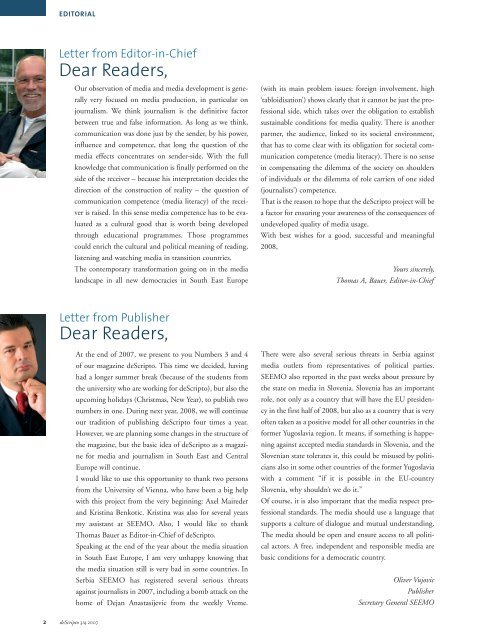DOSSIER
DOSSIER
DOSSIER
Create successful ePaper yourself
Turn your PDF publications into a flip-book with our unique Google optimized e-Paper software.
EDITORIAL<br />
Letter from Editor-in-Chief<br />
Dear Readers,<br />
Letter from Publisher<br />
Dear Readers,<br />
2 deScripto 3/4 2007<br />
Our observation of media and media development is generally<br />
very focused on media production, in particular on<br />
journalism. We think journalism is the definitive factor<br />
between true and false information. As long as we think,<br />
communication was done just by the sender, by his power,<br />
influence and competence, that long the question of the<br />
media effects concentrates on sender-side. With the full<br />
knowledge that communication is finally performed on the<br />
side of the receiver – because his interpretation decides the<br />
direction of the construction of reality – the question of<br />
communication competence (media literacy) of the receiver<br />
is raised. In this sense media competence has to be evaluated<br />
as a cultural good that is worth being developed<br />
through educational programmes. Those programmes<br />
could enrich the cultural and political meaning of reading,<br />
listening and watching media in transition countries.<br />
The contemporary transformation going on in the media<br />
landscape in all new democracies in South East Europe<br />
At the end of 2007, we present to you Numbers 3 and 4<br />
of our magazine deScripto. This time we decided, having<br />
had a longer summer break (because of the students from<br />
the university who are working for deScripto), but also the<br />
upcoming holidays (Christmas, New Year), to publish two<br />
numbers in one. During next year, 2008, we will continue<br />
our tradition of publishing deScripto four times a year.<br />
However, we are planning some changes in the structure of<br />
the magazine, but the basic idea of deScripto as a magazine<br />
for media and journalism in South East and Central<br />
Europe will continue.<br />
I would like to use this opportunity to thank two persons<br />
from the University of Vienna, who have been a big help<br />
with this project from the very beginning: Axel Maireder<br />
and Kristina Benkotic. Kristina was also for several years<br />
my assistant at SEEMO. Also, I would like to thank<br />
Thomas Bauer as Editor-in-Chief of deScripto.<br />
Speaking at the end of the year about the media situation<br />
in South East Europe, I am very unhappy knowing that<br />
the media situation still is very bad in some countries. In<br />
Serbia SEEMO has registered several serious threats<br />
against journalists in 2007, including a bomb attack on the<br />
home of Dejan Anastasijevic from the weekly Vreme.<br />
(with its main problem issues: foreign involvement, high<br />
‘tabloidisation’) shows clearly that it cannot be just the professional<br />
side, which takes over the obligation to establish<br />
sustainable conditions for media quality. There is another<br />
partner, the audience, linked to its societal environment,<br />
that has to come clear with its obligation for societal communication<br />
competence (media literacy). There is no sense<br />
in compensating the dilemma of the society on shoulders<br />
of individuals or the dilemma of role carriers of one sided<br />
(journalists’) competence.<br />
That is the reason to hope that the deScripto project will be<br />
a factor for ensuring your awareness of the consequences of<br />
undeveloped quality of media usage.<br />
With best wishes for a good, successful and meaningful<br />
2008,<br />
Yours sincerely,<br />
Thomas A, Bauer, Editor-in-Chief<br />
There were also several serious threats in Serbia against<br />
media outlets from representatives of political parties.<br />
SEEMO also reported in the past weeks about pressure by<br />
the state on media in Slovenia. Slovenia has an important<br />
role, not only as a country that will have the EU presidency<br />
in the first half of 2008, but also as a country that is very<br />
often taken as a positive model for all other countries in the<br />
former Yugoslavia region. It means, if something is happening<br />
against accepted media standards in Slovenia, and the<br />
Slovenian state tolerates it, this could be misused by politicians<br />
also in some other countries of the former Yugoslavia<br />
with a comment “if it is possible in the EU-country<br />
Slovenia, why shouldn’t we do it.”<br />
Of course, it is also important that the media respect professional<br />
standards. The media should use a language that<br />
supports a culture of dialogue and mutual understanding.<br />
The media should be open and ensure access to all political<br />
actors. A free, independent and responsible media are<br />
basic conditions for a democratic country.<br />
Oliver Vujovic<br />
Publisher<br />
Secretary General SEEMO

















